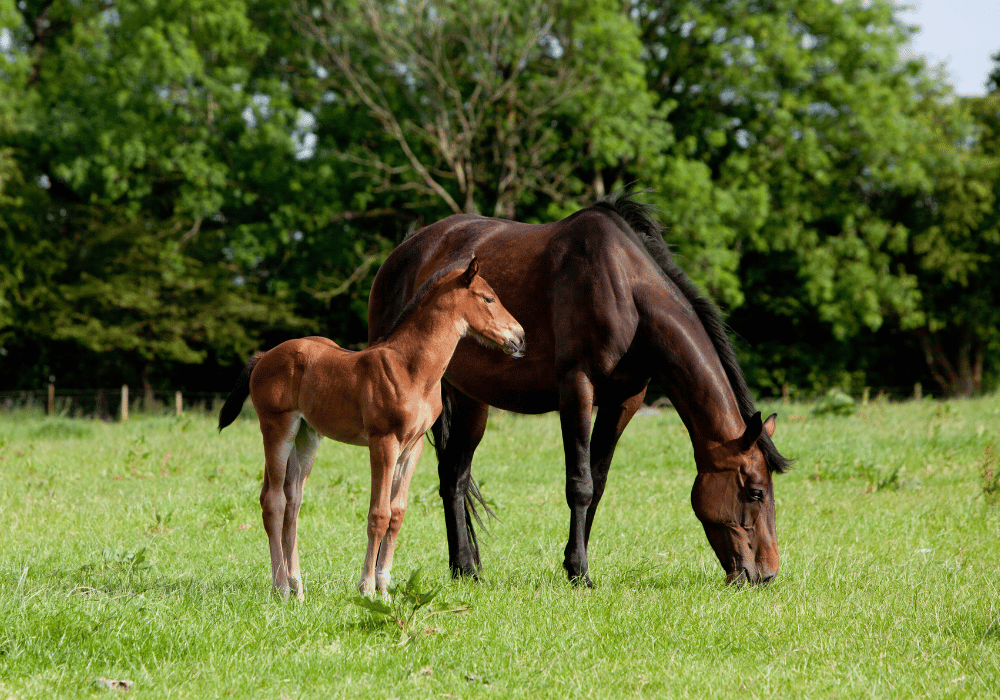If you own a mare, you may at some point consider breeding from her. Whilst breeding from your mare may be a rewarding and worthwhile experience, you should always ask yourself the question: Should I breed my mare? There are several things to consider, including costs, welfare, ethical issues and practical considerations. This blog article outlines some of the things owners should consider before breeding from their mare.
Is Your Mare a Good Candidate for Breeding?
Before breeding your mare, you need to objectively assess whether your mare is a good candidate for breeding. Conformation, temperament, genetic conditions, and other health issues all need to be taken into account.
Health Considerations
Firstly, you should ensure that your mare is in good health before you breed her. A healthy mare is more likely to conceive, and less likely to experience complications before, during and after foaling.
Furthermore, you should be aware of any health conditions that could be passed onto the foal. These could include genetic diseases, or health problems that may be influenced by genetics. Breeding from a mare that has genetic health problems is a potential welfare issue for the foal or that foal’s future offspring.
Your vet should examine your mare to check for various issues that may impact fertility and the chances of successfully putting your mare in foal. They will be able to advise you on the risks associated with breeding your individual mare.
Temperament and Behaviour
Your mare’s temperament is another important consideration. A mare that is straightforward to handle is likely to be calmer, happier, and easier to work with before, during and after the pregnancy.
Furthermore, a mare with a good temperament is more likely to produce a foal with a similar personality. This is more likely to result in a foal that is easier to handle and ultimately more straightforward to back and train when the time comes.
The Costs of Breeding a Horse
Breeding horses can be incredibly exciting and rewarding, but it can also be expensive. Complications can and do occur, and it is important to factor in expected and unexpected costs associated with breeding your mare.
The costs of breeding a horse can include, but are not limited to:
- Pre-breeding health checks
- Stud / AI fees
- Infertility investigations
- Emergency treatment – before, during and after foaling for mare and / or foal
- Routine care of the broodmare – livery bills, additional feed / supplements / bedding plus any vet, farrier, dentistry bills. Additional vaccinations are strongly recommended for in-foal mares to help protect against Equine Herpes virus abortion and also to reduce the risk of rotavirus diarrhoea in the foal
- Transport for mare and foal
- Care for the mare and foal once the foal is born
Working with a knowledgeable equine vet before, during and after your mare’s pregnancy will help provide the best chance of a positive outcome. You will also need to work with your farrier and other professionals throughout the process. You can read more about the costs of breeding a horse in our other blog.
After the Foal is Born
The work does not stop once the foal is born. Not only will you need to budget for the financial costs of owning an extra horse, but you will also need to make a number of practical considerations.
The things you will need to plan for include:
- Healthcare costs – routine veterinary care, dentistry and farrier bills as well as potential emergency bills. Additional care from your vet / farrier team may be needed to manage the foal’s early limb development. If you have a colt foal, you may need to consider having it gelded.
- Livery bills – if you are on a livery yard, they may charge you extra for the foal. Once it is weaned, you will need to pay for an additional stable. You will need to have a means of providing an appropriate companion for the foal at weaning time.
- Time and expertise – do you have the time and expertise required to care for the foal? It is important that foals are handled regularly from an early age and taught the behaviours that you expect of them. As a foal gets older, it will require a great deal of handling, training (e.g. loading, standing for the vet / farrier), and backing. Young horses can be more challenging to ride and handle, and you may require help from a trainer or instructor or professional breaker.
- Will you keep or sell the foal, and when? How will you ensure it goes to a good home?
All these things should be carefully considered before you put your mare in foal. It is important to not underestimate the financial and practical commitment of breeding your mare.
Avonvale Equine Vet Practice | Equine Reproductive Services
We are an independent equine vet practice based in Upton, near Banbury. Our equine breeding services are led by Naomi de Pennington, who has a particular interest in stud and foal medicine. We offer a number of equine reproduction services, including artificial insemination (AI), equine infertility investigation, management of the pregnant mare and post-foaling care. If you have any questions about our stud medicine services or are considering putting your mare in foal, call our Reception on 01295 670 501.









